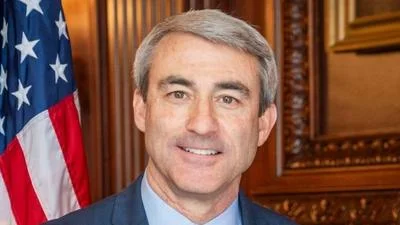Dave Murphy, Wisconsin State Representative for 56th District | Official Website
Dave Murphy, Wisconsin State Representative for 56th District | Official Website
According to the Wisconsin State Legislature's official website, the bill was described as follows: "flags flown, hung, or displayed from a flagpole or the exterior of state and local buildings and eliminating a related administrative rule".
The following is our breakdown, based on the actual bill text, and may include interpretation to clarify its provisions.
In essence, this bill establishes regulations for flags flown from the exterior of state and local government buildings, including schools, by permitting only the U.S. flag, the Wisconsin state flag, and flags of state agencies. It allows exceptions for flags commemorating veterans and military services, federally recognized American Indian tribes, states, U.S. territories, foreign nations for diplomatic purposes, local governments, first responder units, neighboring state flags at entry ports, flags at marinas and transport terminals if for safety purposes, and official school or university flags for special events. Flags supporting political parties, social causes, or representing holidays are prohibited. The bill does not apply to buildings leased to private entities or recognized American Indian reservations. An existing administrative rule governing similar regulations is repealed.
The bill was co-authored by Senator Dan Feyen (Republican-20th District), Representative David Armstrong (Republican-67th District), Representative Elijah R. Behnke (Republican-6th District), Representative Robert Brooks (Republican-59th District), Representative Barbara Dittrich (Republican-99th District). It was co-sponsored by Senator Cory Tomczyk (Republican-29th District), along six other co-sponsors.
David Murphy has co-authored or authored another 28 bills since the beginning of the 2025 session, with none of them being enacted.
Murphy graduated from the University of Wisconsin-Fox Valley in 1974.
Murphy, a Republican, was elected to the Wisconsin State Assembly in 2013 to represent the state's 56th Assembly district, replacing previous state representative Michelle Litjens.
In Wisconsin, the legislative process starts when a senator, constituent, group, or agency proposes an idea for a bill. After drafting, the bill is introduced, numbered, and referred to a committee for review and public input. If approved, it moves through three readings and votes in both the Senate and Assembly. Once both chambers pass the same version, the bill goes to the governor, who can sign it, veto it, or let it become law without a signature. Only a small share of bills introduced each session ultimately become law. You can learn more about the Wisconsin legislative process here.
| Bill Number | Date Introduced | Short Description |
|---|---|---|
| AB58 | 02/24/2025 | Flags flown, hung, or displayed from a flagpole or the exterior of state and local buildings and eliminating a related administrative rule |
| AB55 | 02/24/2025 | Possession of a firearm on school grounds by school employees and fees for licenses to carry a concealed weapon. (FE) |
| AB47 | 02/17/2025 | Tuition and fee remission for certain veterans and their dependents enrolled in the University of Wisconsin System or a technical college. (FE) |
| AB27 | 02/17/2025 | Expanding veterans benefits to individuals who served in Laos in support of the United States during the Vietnam War |






 Alerts Sign-up
Alerts Sign-up